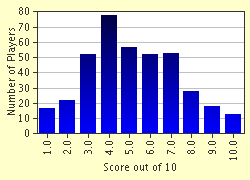Quiz Answer Key and Fun Facts
1. What is the military origin of the word "aloof"?
2. What is the military origin of the phrase "swinging the lead"?
3. What is the military origin of the phrase "run the gauntlet"?
4. What is the military origin of the word "grenade"?
5. What is the military origin of the word "deadline"?
6. What is the military origin of the phrase "cut and run"?
7. What is the military origin of the phrase "biting the bullet"?
8. What is the military popularly misconceived origin of the phrase "to freeze the balls off a brass monkey"?
9. What is the military origin of the phrase "the balloon's gone up"?
10. What is the military origin of the phrase "at full tilt"?
Source: Author
Simon_Templar
This quiz was reviewed by FunTrivia editor
Beatka before going online.
Any errors found in FunTrivia content are routinely corrected through our feedback system.

